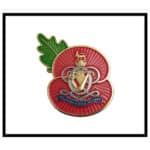Lt Col Geoffrey Palmer, who has died aged 85, was awarded an MC when serving with the 7th Hussars in Italy in October 1944.
Throughout the recent fighting during June and July’, recorded the citation, this officer has displayed great bearing and disregard for his personal safety. Furthermore, his conduct has at all times been an inspiration to all ranks.
At Osimo on July 5 he was commanding a troop and by his skill and leadership succeeded in extricating his troop from a very dangerous position and destroying a 75mm anti-tank gun. At Torto on July 17, when the Regiment was under command of the 2nd Polish Armoured Brigade, Capt Palmer was in command of two troops. Getting very quickly on to his objective, he remained there for the rest of the day in spite of very heavy mortar fire, giving support to another squadron which was working forward.
By his quickness and alertness, he dealt with snipers and Spandaus which were causing our infantry casualties. At Croce on August 9, when the Regiment was under command of the 5th Polish Division, Capt Palmer was again in command of two troops and gave very valuable support to the infantry, in the very close and heavy country in which there were snipers, bazookas and anti-tank guns.
The above-mentioned cases are characteristic of Capt Palmer’s devotion to duty throughout the war, notably in the Western Desert and Burma’.
Geoffrey Stephan Banks Palmer was born in Chelsea on June 26, 1909, but went to Kenya as a very small boy, where his father was serving with the King’s African Rifles. He was educated at Bedford and then began work as a broker in the city.
At this time he joined the Honourable Artillery Company and after two years in the city, he decided to make the Army his career and enlisted in the ranks, hoping to obtain a cadetship at Sandhurst. After serving with the Sherwood Foresters he transferred to the Welsh Guards.
In 1939 Palmer accompanied the Regiment to Gibraltar and then, soon after the outbreak of the second world war, to Marseilles, en route to Arras where their role was to guard Viscount Gort’s GHQ. Just before the Germans attacked, Palmer was sent on leave to London.
When he eventually reached France his attempts to link up with his Regiment were frustrated. Instead, he was incorporated into a mixed party, many of them sappers. He was nearly blown up by a bridge they were demolishing, before being evacuated from Dunkirk.
Soon after arriving in England, he was sent to Sandhurst and then commissioned into the 7th Hussars.
He joined the Regiment in Egypt in time for Wavell’s ‘Crusader offensive, capturing a German armoured car. Subsequently, in the Battle of Sidi Rezegh, the 7th Hussars lost 26 out of their 39 tanks and sustained heavy casualties. The disaster necessitated their return to Cairo to complete re-equipment.
As the Japanese had now attacked in the Far East the Regiment was hastily despatched to Rangoon. Its task was to cover the retreat of the heavily outnumbered and outgunned 17th Division, which had already lost two-thirds of its strength. This gruelling assignment was completed in May. During the campaign, Palmer’s squadron was attacked by gas bombs, the only occasion when gas was used in the second world war.
After further training in India, Palmer’s Regiment was sent to Iraq, then to Palestine, and finally to Suez. During this time Palmer fell ill with acute myelitis, a form of paralysis. After rejoining the Regiment, he landed in Italy and fought through the entire campaign, which finally reached Venice.
After the war, Palmer was seconded to the police in Malaya and Singapore for three years, with the brief of forming an internal security battalion. The battalion had to take prompt action when riots broke out in Singapore in December 1950 over a religious dispute.
Palmer’s next postings were with the 6th Armoured Division in Germany, thence to Korea, and then back to Johore Bahru, Malaya, where he was in command of the Far East Land Forces Training Centre.
He was a keen cricketer, rugby player and golfer. He was also a lover of classical music, particularly opera, and was a model railway enthusiast. He enjoyed gardening and sailing. He married Shiela Raine in 1949 and they had a daughter.
Reproduced by kind permission of The Daily Telegraph.



